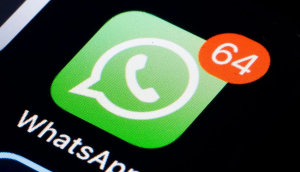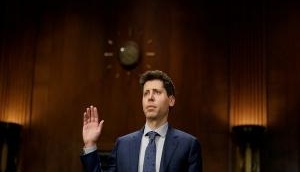
In an update to its terms of service and privacy policy, WhatsApp has announced that it will share user data - of over 1 billion WhatsApp users - with Facebook.
The Mark Zuckerberg-owned Facebook bought the messaging app for $19 billion in 2014.
WhatsApp explains that users will not see any ads on the messaging platform. Instead, data from WhatsApp will be used to target ads on Facebook and will help influence the 'You may also know' profiles that are displayed on your newsfeed.
Read more: Here's how you can stop WhatsApp from sharing your number with Facebook
While this may appear to be a small change, it actually is a major shift for WhatsApp, which has finally lifted the lid on its revenue source.
Since 2012, WhatsApp has regularly updated its legal policy to include a number of changes. The latest update specifies that WhatsApp is a part of Facebook and that it may be open to commercial messaging.
Here's an extract from the blogpost that WhatsApp shared on 25 August:
"But by coordinating more with Facebook, we'll be able to do things like track basic metrics about how often people use our services and better fight spam on WhatsApp. And by connecting your phone number with Facebook's systems, Facebook can offer better friend suggestions and show you more relevant ads if you have an account with them. For example, you might see an ad from a company you already work with, rather than one from someone you've never heard of."
WhatsApp has specified that it plans to integrate phone numbers with Facebook so that the social networking giant can offer better friend suggestions and more relevant advertisements.
At present, WhatsApp has over 1 billion users - a massive user base which does not translate into monetary benefits for the messaging platform. However, it is also important to note that the number of WhatsApp users surged drastically after it was acquired by Facebook.
How WhatsApp's evolution affects you
The part of the updated policy that affects users the most is the fact that WhatsApp plans to share contacts with Facebook. There is also a possibility of WhatsApp unveiling a bulk messaging option in the future, given its enormous reach.
"New ways to use WhatsApp. We will explore ways for you and businesses to communicate with each other using WhatsApp, such as through order, transaction, and appointment information, delivery and shipping notifications, product and service updates, and marketing. For example, you may receive flight status information for upcoming travel, a receipt for something you purchased, or a notification when a delivery will be made. Messages you may receive containing marketing could include an offer for something that might interest you. We do not want you to have a spammy experience; as with all of your messages, you can manage these communications, and we will honor the choices you make," the blogpost reads.
WhatsApp's no-ads policy, which has been a characteristic feature of the popular app, has been a matter of intense speculation over the years. The app was initially launched on iOS as a paid app, then went for a freemium model, charging a minimal fee each year. As of 2016, the application can be used free of cost.
"Commercial Messaging. We will allow you and third parties, like businesses, to communicate with each other using WhatsApp, such as through order, transaction, and appointment information, delivery and shipping notifications, product and service updates, and marketing. For example, you may receive flight status information for upcoming travel, a receipt for something you purchased, or a notification when a delivery will be made. Messages you may receive containing marketing could include an offer for something that might interest you. We do not want you to have a spammy experience; as with all of your messages, you can manage these communications, and we will honor the choices you make," the WhatsApp post reads.
This means that you may soon receive a WhatsApp notification from your airlines telling you about a delay in your flight. Your bank may use WhatsApp to inform you about your credit card statement.
In 2009, the WhatsApp policy - as written by founder Jan Koum - read as follows: "We have not, we do not, and we will not ever sell your personal information to anyone. Period. End of story".
By 2012, the policy evolved. "We do not use your mobile phone number or other Personally Identifiable Information to send commercial or marketing messages without your consent or except as part of a specific program or feature for which you will have the ability to opt-in or opt-out," it then read.
In a paradigm shift, the policy now reads: "We will explore ways for you and businesses to communicate with each other using WhatsApp."
All the policy updates that WhatsApp has now rolled out fall well within the standard legal norms.
WhatsApp assures users that it will not share its messages with Facebook. (remember end-to-end encryption?).
If you're worrying about the privacy red flags in the new policy, then fret not. You can opt out of it all.
How to stop WhatsApp from sharing your data
There are two main ways of opting out of the new data sharing deal:
1) Use the pop up to click 'Read More'.
Untick the box that reads "Share my WhatsApp account information with Facebook".
2) If you have already accepted the new term, you have 30 days to opt out. Find the account tab on your WhatsApp settings menu. Use the "share my account info" button to mark your preference.
First published: 26 August 2016, 7:01 IST







![BJP's Kapil Mishra recreates Shankar Mahadevan’s ‘Breathless’ song to highlight Delhi pollution [WATCH] BJP's Kapil Mishra recreates Shankar Mahadevan’s ‘Breathless’ song to highlight Delhi pollution [WATCH]](https://images.catchnews.com/upload/2022/11/03/kapil-mishra_240884_300x172.png)

![Anupam Kher shares pictures of his toned body on 67th birthday [MUST SEE] Anupam Kher shares pictures of his toned body on 67th birthday [MUST SEE]](https://images.catchnews.com/upload/2022/03/07/Anupam_kher_231145_300x172.jpg)






